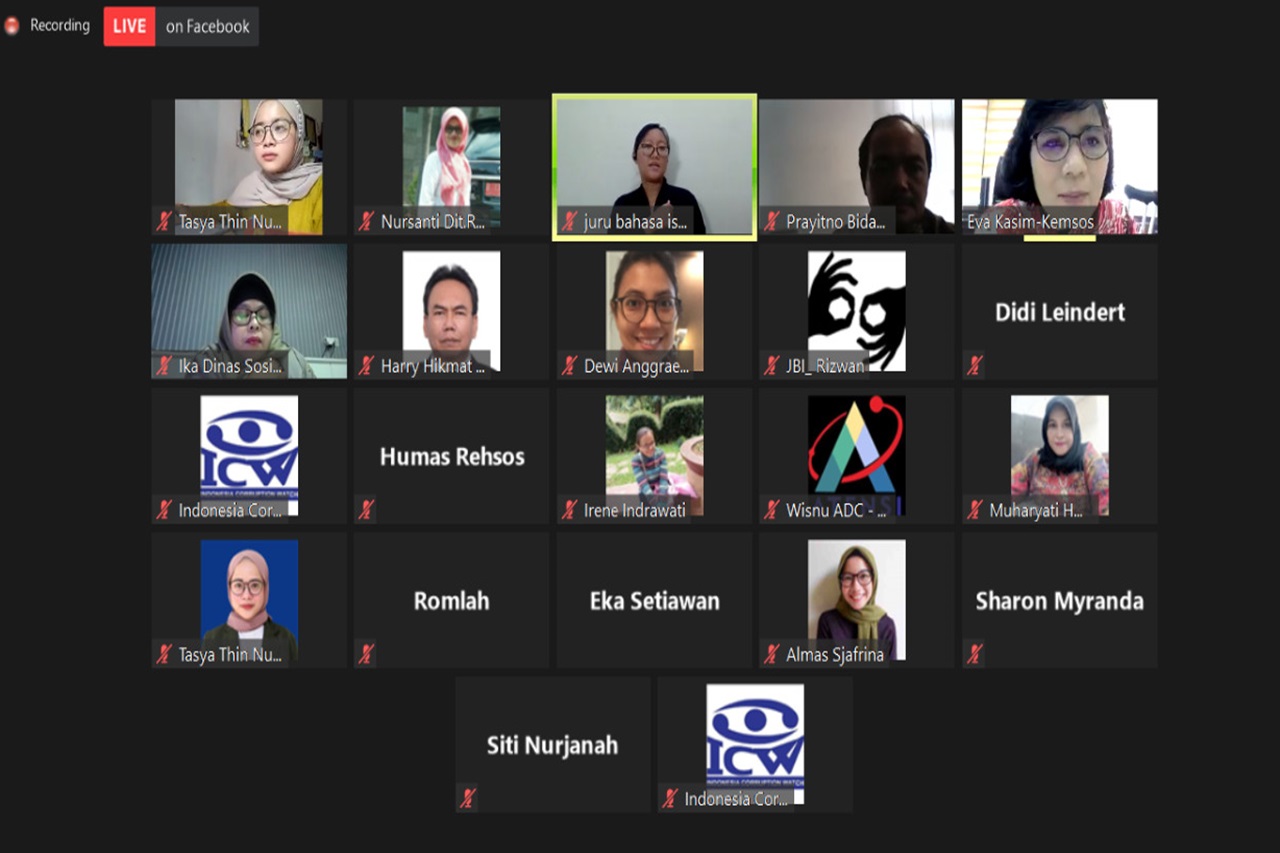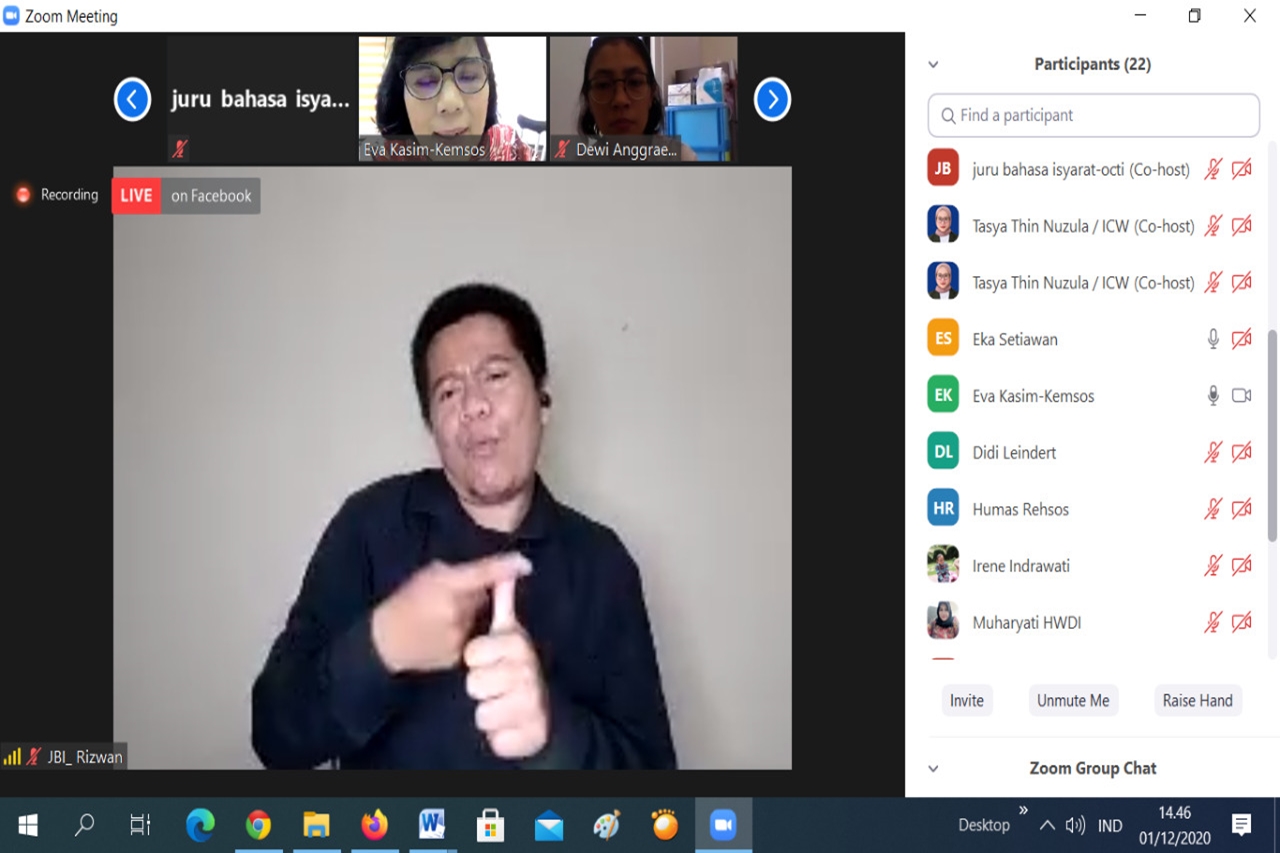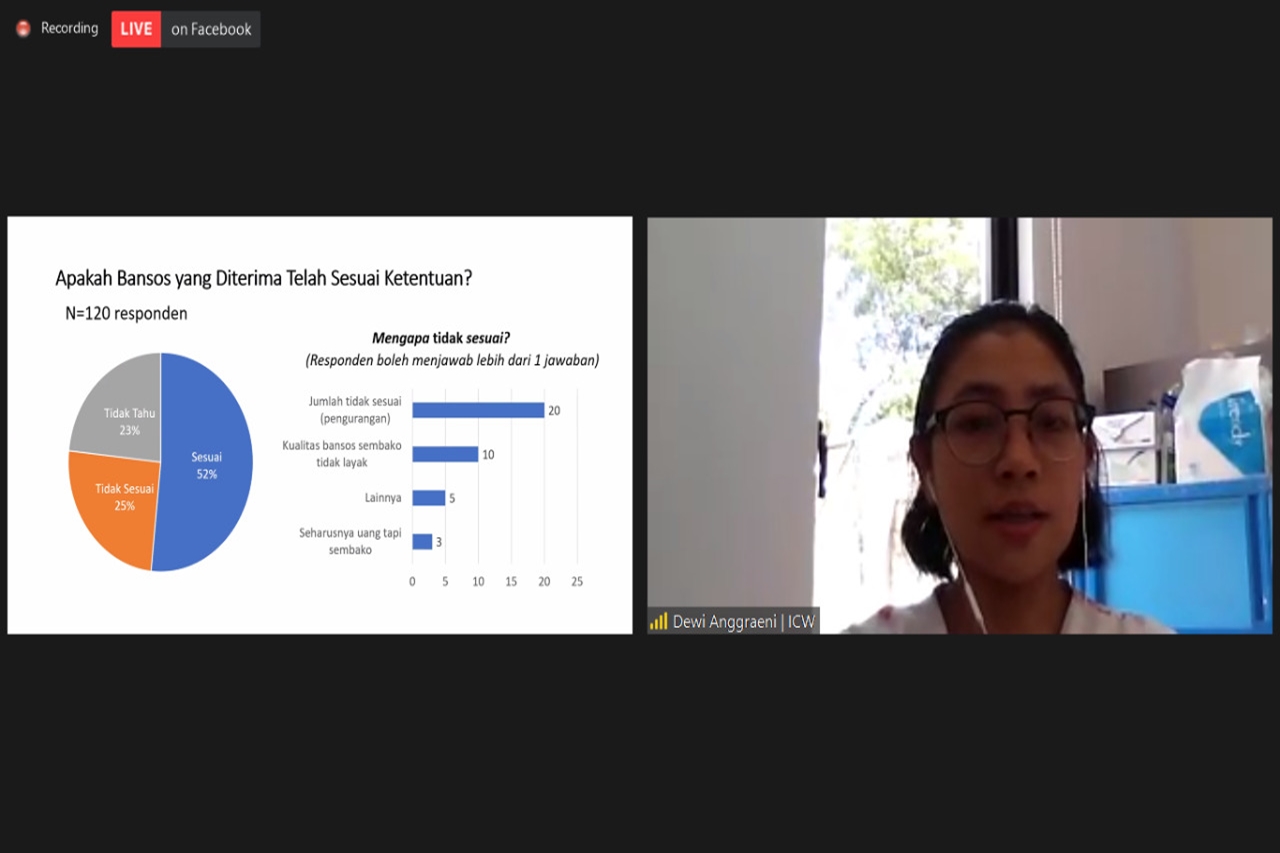Writer :
Humas Dit. Penyandang Disabilitas
Editor :
Annisa YH
Translator :
Intan Qonita N
JAKARTA (December 1, 2020) - The Ministry of Social Affairs has continuously made efforts to mitigate the impact of the pandemic on the community, among others by implementing a policy of providing social assistance to vulnerable groups. Persons with Disabilities are one of the beneficiaries of the social assistance program included in the Social Welfare Integrated Data (DTKS).
"The role of the Ministry of Social Affairs in handling COVID-19 is through Regular Social Assistance and Special Social Assistance. Regular social assistance includes the expansion of the basic food assistance program to 20 million Beneficiary Groups (KPM) and an increase in the social assistance index from Rp150.000 to Rp200.000/month/Beneficiary Families (KPM). Furthermore, "There is an increase and acceleration of the distribution of the Family Hope Program (PKH) social assistance from 9.2 million KPM to 10 million KPM and distribution from 3 months to per month," said Harry.
Harry added that the Ministry of Social Affairs received a special assignment from the President for social assistance in Greater Jakarta in anticipation of going home and Direct Cash Assistance (BLT) for all of Indonesia except Jabodetabek. "For the special assistance for the DKI Jakarta area in the form of 200 thousand basic food packages, death compensation for the heirs of COVID-19 victims who died. There are also basic food packages for 460 Social Welfare Institutions (LKS) in Indonesia and assistance for strengthening sustainability grants for 10.000 KPM ' explained Harry.
In handling the impact of COVID-19 in the DKI Jakarta area, the Ministry of Social Affairs also has a Special Social Assistance by distributing basic food assistance for Jabodetabek 1.3 million families, Bodetabek 600.000 families. Assistance in the form of basic food/rice Rp600.000/family/month in April, May and June and Rp300.000/family/month in July-December.
"The cumulative total distribution of basic food social assistance packages for displaced residents due to COVID-19 originating from the central office refocusing fund, in this case through the Directorate of Social Rehabilitation for Persons with Disabilities, is 11,082 packages. Meanwhile, social assistance through regional offices through the Technical Implementation Unit (UPT) of Social Rehabilitation Directorate General is 19,223 packages," he explained. Harry.
The distribution of special assistance to the President of the Republic of Indonesia for Persons with Disabilities as many as 7072 packages in the Jabodetabek area is based on data by name by address that has been included in DTKS.
The integrated monitoring and evaluation of the Coordinating Ministry for Human Development and Culture for the Jabodetabek basic food assistance has been carried out with monitoring in 14 urban villages in 5 administrative city areas of DKI Jakarta on 12-13 May 2020 for 95 KPM and 36 distribution point managers. "Based on the monitoring and evaluation of the satisfaction of the Jabodetabek basic food assistance, 77.1% of recipients are satisfied and 11.5% are not satisfied. In terms of the adequacy of meeting their food needs for 2 weeks, 58.3% of the recipients of the social assistance answered enough and 36.5% not enough," said Harry.
"The role of the Ministry of Social Affairs in handling COVID-19 is through Regular Social Assistance and Special Social Assistance. Regular social assistance includes the expansion of the basic food assistance program to 20 million Beneficiary Groups (KPM) and an increase in the social assistance index from Rp150.000 to Rp200.000/month/Beneficiary Families (KPM). Furthermore, "There is an increase and acceleration of the distribution of the Family Hope Program (PKH) social assistance from 9.2 million KPM to 10 million KPM and distribution from 3 months to per month," said Harry.
Harry added that the Ministry of Social Affairs received a special assignment from the President for social assistance in Greater Jakarta in anticipation of going home and Direct Cash Assistance (BLT) for all of Indonesia except Jabodetabek. "For the special assistance for the DKI Jakarta area in the form of 200 thousand basic food packages, death compensation for the heirs of COVID-19 victims who died. There are also basic food packages for 460 Social Welfare Institutions (LKS) in Indonesia and assistance for strengthening sustainability grants for 10.000 KPM ' explained Harry.
In handling the impact of COVID-19 in the DKI Jakarta area, the Ministry of Social Affairs also has a Special Social Assistance by distributing basic food assistance for Jabodetabek 1.3 million families, Bodetabek 600.000 families. Assistance in the form of basic food/rice Rp600.000/family/month in April, May and June and Rp300.000/family/month in July-December.
"The cumulative total distribution of basic food social assistance packages for displaced residents due to COVID-19 originating from the central office refocusing fund, in this case through the Directorate of Social Rehabilitation for Persons with Disabilities, is 11,082 packages. Meanwhile, social assistance through regional offices through the Technical Implementation Unit (UPT) of Social Rehabilitation Directorate General is 19,223 packages," he explained. Harry.
The distribution of special assistance to the President of the Republic of Indonesia for Persons with Disabilities as many as 7072 packages in the Jabodetabek area is based on data by name by address that has been included in DTKS.
The integrated monitoring and evaluation of the Coordinating Ministry for Human Development and Culture for the Jabodetabek basic food assistance has been carried out with monitoring in 14 urban villages in 5 administrative city areas of DKI Jakarta on 12-13 May 2020 for 95 KPM and 36 distribution point managers. "Based on the monitoring and evaluation of the satisfaction of the Jabodetabek basic food assistance, 77.1% of recipients are satisfied and 11.5% are not satisfied. In terms of the adequacy of meeting their food needs for 2 weeks, 58.3% of the recipients of the social assistance answered enough and 36.5% not enough," said Harry.
The Ministry of Social Affairs will optimize efforts to reach and provide guidance to persons with disabilities whose number is estimated at 10.6% of the population or around 28.6 million people based on the 2019 National Socio-Economic Survey held by Statistics Indonesia (BPS).
"Currently, the data for persons with disabilities that are included in the DTKS is only around 1.3 million. We need data on E-KTPs that already include the various disability codes and also the existence of an E-Family Card. We are preparing it in 2021," explained Harry.
The Director of Social Rehabilitation for Persons with Disabilities, Eva Rahmi Kasim also reiterated the importance of collecting data on Persons with Disabilities. "Let's create fast, productive and accurate data. We urge Organization of Persons with Disabilities (OPD) and Social Welfare Institutions (LKS) to further enhance synergy with all relevant parties in realizing a database of Persons with Disabilities," said Eva.
The Ministry of Social Affairs continues to develop the DTKS for Social Welfare Services Recipients (PPKS), among others, by including various types of disability in accordance with Law Number 8 of 2016 concerning Persons with Disabilities.
"OPD and LKS must also be more pro-active to the Population and Civil Registration Service (Dukcapil) by collecting data on a shuttle basis because they are closer and know who, where and how the condition of Persons with Disabilities is," Eva appealed.
ICW researcher Dewi Anggraeni on this occasion also conveyed the results of a survey on the distribution of social assistance for persons with disabilities in DKI Jakarta. Of the respondents, 87% of the social assistance programs have been targeted for persons with disabilities. However, there are still 13% who are not eligible to receive social assistance but receive social assistance.
"Respondents gave several suggestions to improve the accuracy of social assistance for persons with disabilities, among others, given transportation money to take social assistance, all disabilities received social assistance and preferably in the form of money," said Dewi.
Dewi added that the respondents also gave suggestions regarding the form of social assistance that should be varied so that it is not monotonous and of high quality, re-collecting data if necessary. "Assistance is given directly to the recipient's address so there is no need to queue and there is no reduction in aid or extortion, and clearer information is needed about social assistance," said Dewi.
The results of the ICW survey stated that 42% of respondents are the breadwinners of families with incomes below Rp. 1 million. The majority of respondents admitted that the data collection was carried out by the OPD so it was very important for them to have an OPD. Respondents really hope that people with disabilities will be given more attention, that assistance will be given until the situation is normal and the distribution will be more even.
Share :
 English
English
 Bahasa
Bahasa



